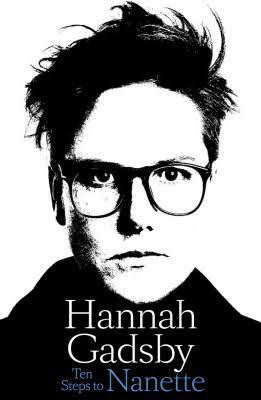 Ten Steps to Nanette
Ten Steps to Nanette
by Hannah Gadsby
Allen & Unwin
Warning: This review contains mentions of sexual assault, suicide and trauma.
Queer Australian comedian Hannah Gadsby is known to many for her appearances on television programs such as Please Like Me and her stand-up comedy performances. Her bio says that her ‘overnight’ success was more than ten years in the making when Netflix launched her hour long multi-award winning show Nanette in 2018.
Gadsby had performed Nanette across the world just over 200 times before its launch on Netflix which earned her Emmy and Peabody Awards. Each performance was different as she was rebuilding herself on stage in front of people, allowing herself to be truly vulnerable and running the gauntlet of her own triggers and traumas. She has said that there is nothing stronger than a broken woman who has rebuilt herself and, in telling her life story, it is revealed that her success actually took her whole life.
Gadsby was born in Tasmania in 1979, in the small town of Smithton, whose only claim to fame was the McCain frozen food factory. Not diagnosed with autism and ADHD until she was in her thirties, she felt a rupture between what others were expecting her to be and who she felt herself to be. She says “I wanted to be a boy so bad it hurt.”
It was not until 1997 that homosexuality was decriminalised in Tasmania and Gadsby felt trapped in her body as well as trapped in the small homophobic town. As a shy and sullen teenager, she discovered that her lifeline at high school was to make people laugh and she would prepare lines that she could use at a later time.
There is a warning in the introduction to her book that the wilderness years of her life contain things like assault, molestation, rape, injury, isolation, suicidal ideation, body image and other mental health difficulties. “There is never a straight line to be found through a life punctuated by trauma” and she describes Nanette as being a “stand-up catharsis” and “an experiment in the transmutation of trauma”.
Apart from needing her story to be heard and understood, she re-wrote the rules of stand-up comedy in that Nanette is “arguably the most deliberately miserable, unfunny hour of comedy ever made”. There are a lot of funny punch lines in the performance but, coinciding with the #metoo movement and the marriage plebiscite, she was able to interrogate her own life to confront the toxicity she has managed to survive.
After living a life like she was a pinball “getting slapped about the place”, she realises that trauma plus time can create comedy, and the only way she has known to take her mental health seriously has been to make a joke of it. Equal parts tragic and touching, Ten Steps to Nanette is a phenomenal account of a phenomenal person who has been able to make her fragmented self into something whole … and call out the “dick-swinging and pseudo-scientific justification” that is ruining lives.
Lezly Herbert
Do you need some support?
If you are struggling with anxiety or depression, support and counselling are available from:
QLife: 1800 184 527 / qlife.org.au (Webchat 3pm – midnight)
QLife are a counselling and referral service for LGBTQIA+ people.
DISCHARGED: info@discharged.org.au / discharged.org.au
Discharged is a trans-led support service with peer support groups for trans and gender diverse folks.
Lifeline: 13 11 14 / lifeline.org.au
Beyondblue: 1300 22 4636 / www.beyondblue.org.au
You can support our work by subscribing to our Patreon
or contributing to our GoFundMe campaign.





